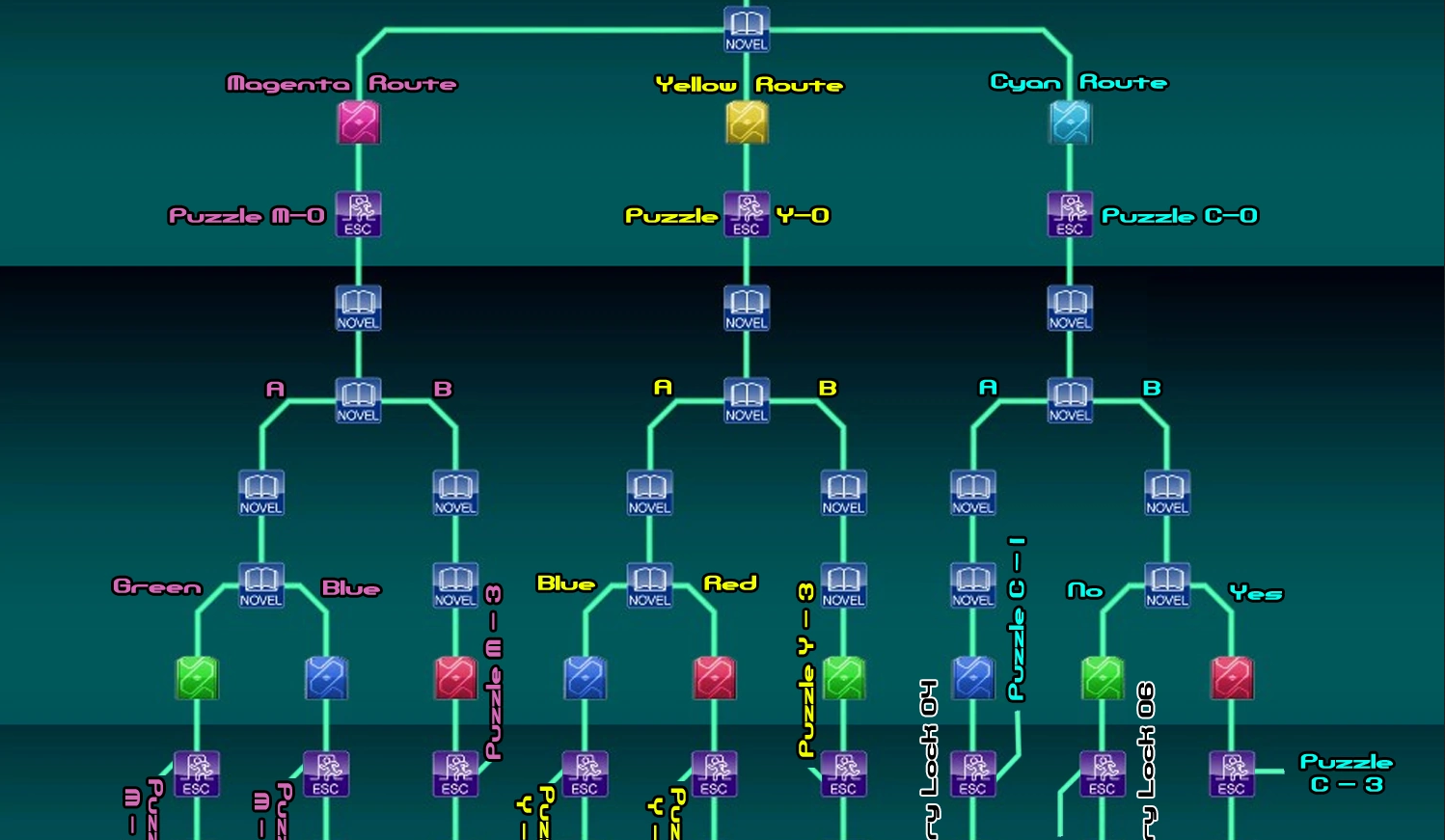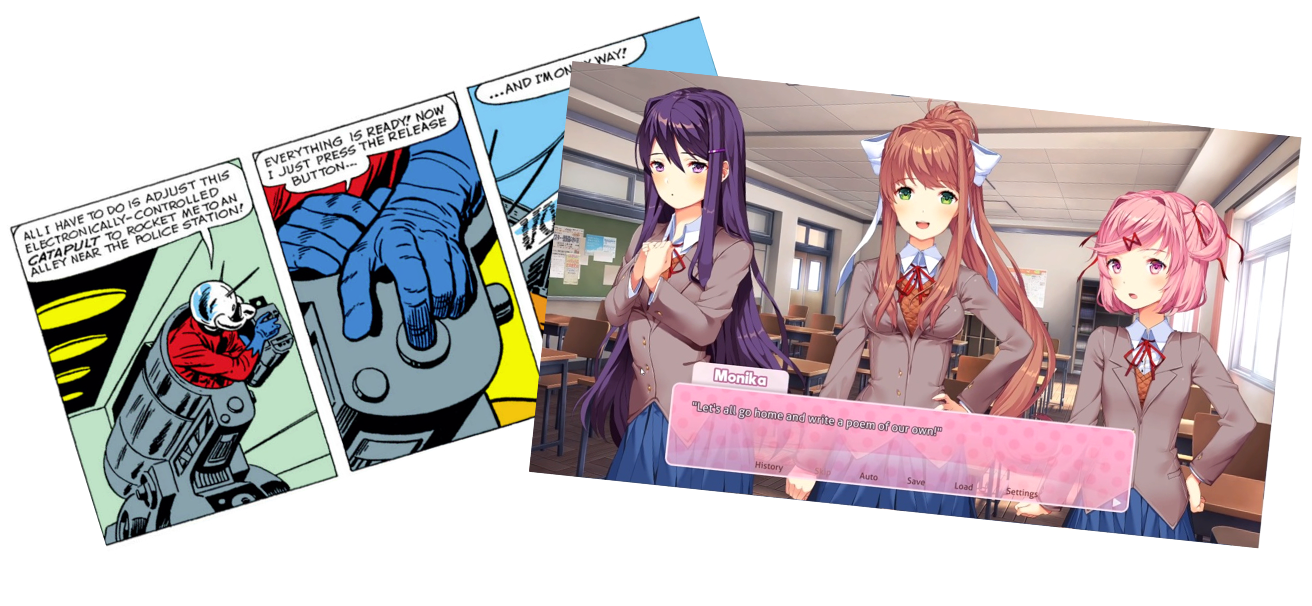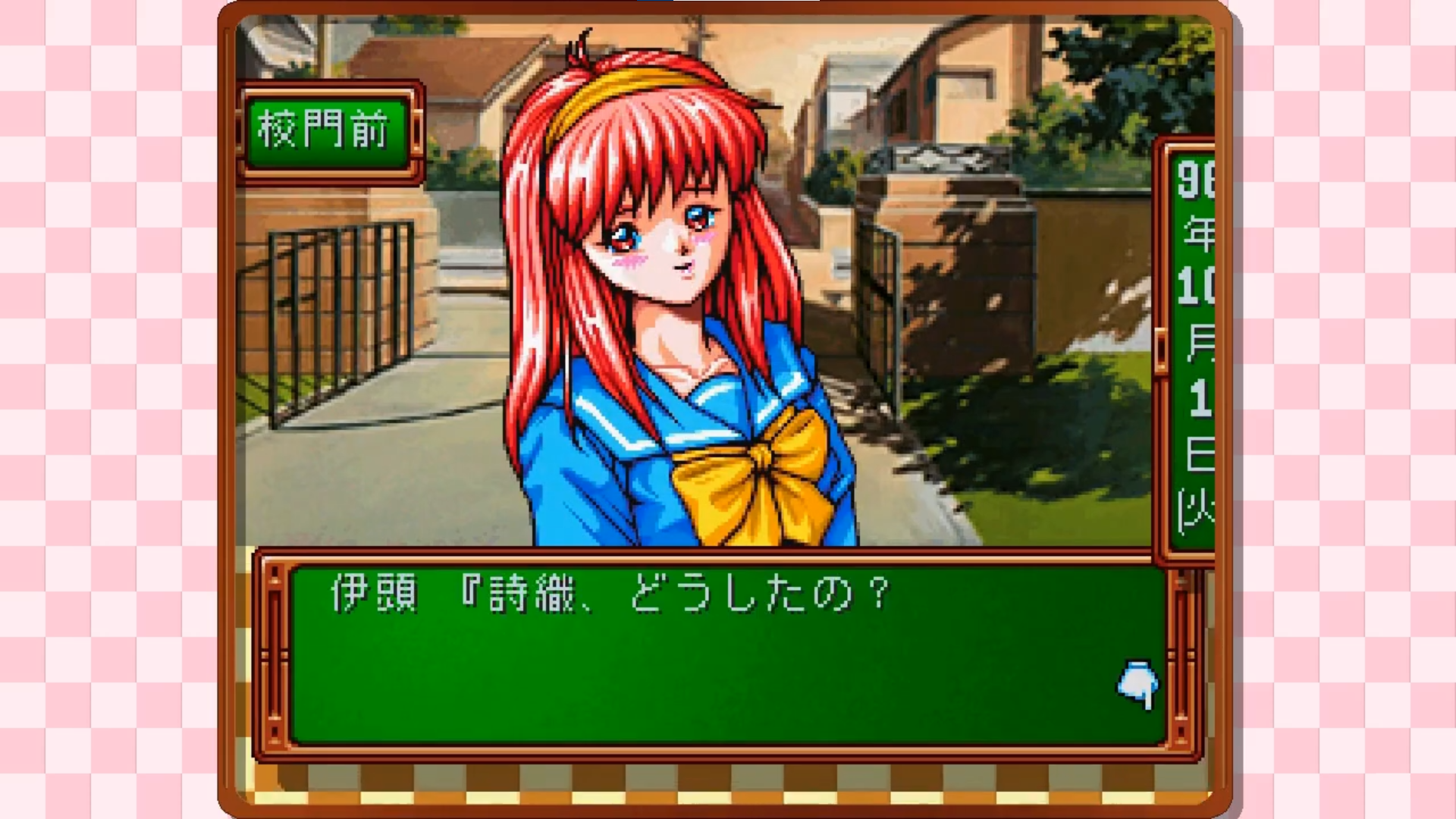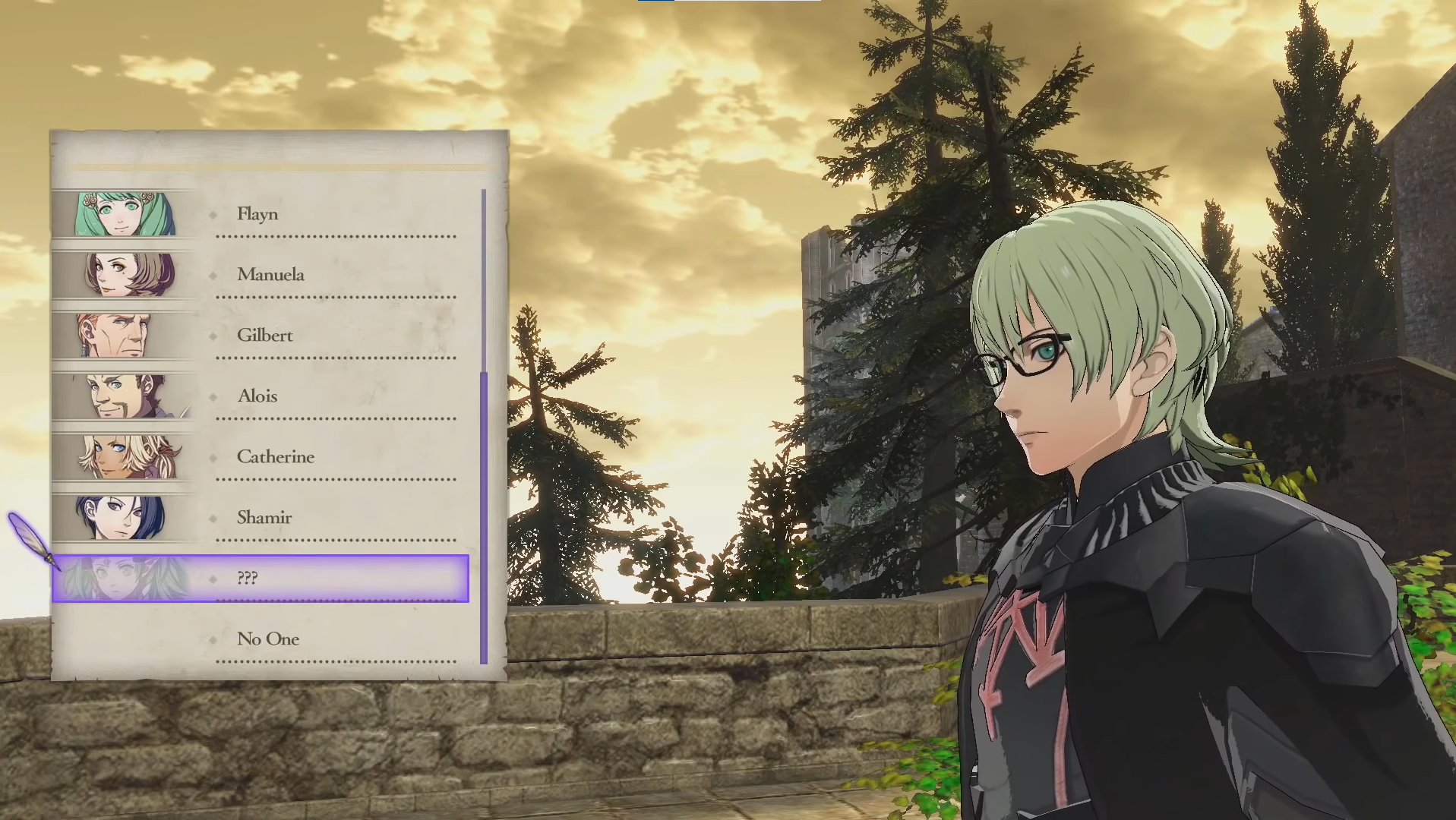
Who's more important to save: your friends, or yourself?

Who's more important to save: your friends, or yourself?

This post contains spoilers for the games Metal Gear Solid 3: Snake Eater, 9 Hours, 9 Persons, 9 Doors, Virtue’s Last Reward, and Doki Doki Literature Club.
Although they’re not as popular as the triple-a, big-budget genres like shooters and MMOs, visual novels have been a staple of the games industry for decades now. The majority of their gameplay consists of simply reading text and progressing the story, something that books do equally well. How is it, then, that they’ve managed to survive in an industry that constantly demands better graphics, more gameplay interactivity, and increased socialisation between players? What is it about visual novels that keeps players engaged, that keeps people playing them when they could stick with a novel, or to a game that lets them interact with their environment?
The lazy answer would be to say that the story aspect of visual novels is better-crafted than other games, but that’s not inherently true. While visual novels generally do focus on their stories more, that doesn’t inherently make them better, any more than it means that a non-visual novel game can’t have a good story. Heck, ask any gamer what their favourite video game story is, and there’s a good chance that the answer won’t be from a visual novel. Other genres can craft characters, plot beats, and worlds just as well as visual novels can, and they can even enhance the players’ engagement by letting the gameplay reflect on an aspect of the story or world.
An example of the latter can be found in the game Metal Gear Solid 3: Snake Eater, a prequel to the popular stealth series. Late in the story the protagonist, Naked Snake, gets his right eye shot out during a torture scene. From this point onwards, if the player goes into first-person view the right side of the screen is darkened - and furthermore, in the game’s re-release for the Nintendo 3DS, the player can no longer use the hardware’s 3D effect while in first-person. It’s ultimately a small change, but it helps to integrate the story with the gameplay and show that actions in cutscenes can still end up affecting the player’s experience.

Of course, not all games choose to integrate their gameplay with their plot like this, but that doesn’t mean that their stories are worse than that of a visual novel. Some games eschew a plot completely, or only give the barest bones of one, and instead rely on players to create their own stories through the gameplay. Crafting games such as Minecraft are strong examples of this, but even multiplayer games like Overwatch rely on this - kill multiple players when you’re only on a sliver of health and you’ll remember it far more than you will all of the nuances of a game’s world and story, no matter how much time has been spent crafting them.
Visual novels themselves can, of course, contain traditional gameplay, but this rarely integrates with the rest of the game that well. Doki Doki Literature Club is a fantastic visual novel, but nobody ever raves about the sections where the game lets you choose different words for your poems. The Danganronpa series gives the player multiple minigames to solve as they progress through trials, but the majority of them are laughably bad at best, and frustrating at worst. Too much gameplay also detracts from the appealing aspects of visual novels - Death end re;Quest advertises itself as being a hybrid of visual novels and RPGs, but it’s really just an RPG that tells its story through a visual novel interface and occasionally asks you to make a choice in it.
So if visual novels can’t compete with other genres in the gameplay department, and their stories can be equalled, why do people still play them? Before answering that question, let’s compare visual novels with a different medium: books. Like books, visual novels use text to tell a story, and while you could argue that visual novels are set apart from books by using images and animations (the visual part of the name, natch), that just invites comparisons to comic books instead (or graphic novels, if you want to be pretentious).

No, the most substantial difference between books and visual novels isn’t the images, animations, or audio of the latter - it’s the interactivity that a visual novel offers, the same interactivity that classifies them as games. A book can paint an image in its reader’s eye just as powerful as the aesthetics and design of a visual novel, but with very few exceptions, a book can’t offer the reader interactivity and a chance to change its plot.
(Before I go on, I’ll add in a quick disclaimer for visual novels which aren’t interactive, or offer very little - of the ones I’ve played, I haven’t been that impressed with them, and this article is about how to make a visual novel engaging. WORLD END ECONOMiCA dragged a bit much for my liking, and while The House in Fata Morgana told a good story overall, its choices typically just brought the player to a dead end before getting them to continue. Neither were terrible experiences, but I do question whether a visual novel was the best medium for each of them).
Interactivity allowing players to guide the direction of a visual novel’s story is the genre’s greatest strength, and it’s this that helps engage players. A player isn’t just reading a visual novel - they’re shaping the direction that its story goes in. Just look at the quintessential visual novel genre, the dating sim - players relish getting to choose which love interest the main character ends up with, and by being given the option, they get far more invested in it than they would if they were simply reading a scripted romance. Even if a scripted romance involved the protagonist ending up with the love interest of the player’s choice, they’ll still feel less invested in it if they don’t feel that their decisions throughout the game have been meaningful.

It gets even better - remember how earlier we discussed how games in genres other than visual novels can integrate their gameplay and their story together? Some visual novels have done the same, making multiple player choices an explicit part of the narrative. The visual novel 9 Hours, 9 Persons, 9 Doors reveals that the game’s branching routes all exist because the true protagonist of the game is looking into potential futures. Its sequel, Virtue’s Last Reward, has its protagonist slowly realise that he is jumping between different timelines as part of a plan to train him to stop a disaster. Doki Doki Literature Club requires that players rewind their routes before a certain point in order to get the best ending, with a character later realising what’s happened since she’s explicitly data. All of these help to keep the game engaging, and make the player’s choices feel more meaningful.
The only problem with this argument is that video games can also have branching storylines and meaningful choices, so therefore visual novels have nothing over them…right? I’m going to have to disagree. While it’s true that video games can have the player’s actions affect the storyline, most of the time the changes are simply a different line of dialogue here and there, or giving the player a new item. There are exceptions, of course - Dishonored and Mass Effect are both games where it feels like all of the player’s choices have meaningful consequences - but these tend to be few and far between.
As a further example of this, compare the dating sim genre to the romance of Fire Emblem: Three Houses. A dating sim has players working to woo their love interest over the course of many hours, getting to know the character in the process and seeing unique events. Three Houses, by contrast, has players talk to their allies three times between missions, then at the end of the game asks the player to choose one of those allies to marry (assuming that their sexual orientation is compatible with your chosen gender). It’s hard to feel that yours is a great romance for the ages when you know that multiple other characters all would have said yes to the proposal just as easily.

Ultimately, while there are many things that traditional games can do better than visual novels, visual novels do have a fantastic advantage over them in that it’s far easier for them to create meaningful choices - if nothing else, there’s less assets to be produced for the ensuring story split. By embracing this flexibility of story and letting the players guide the way the plot plays out, a visual novel can engage with its audience meaningfully and create a memorable experience.
Back to news